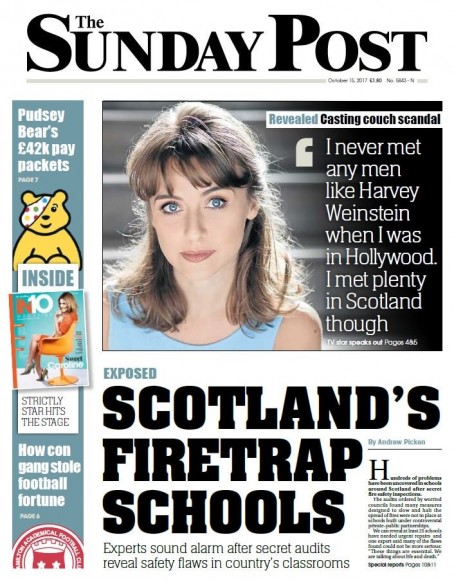The press watchdog has upheld an actress’s complaint against a Sunday newspaper about a piece over which she was given partial copy approval.
The Independent Press Standards Organisation has rapped the Dundee-based Sunday Post after it failed to provide a reporter’s note of a quote reportedly said by Joanne Thomson during an interview with the newspaper carried out in the wake of sexual harassment allegations against Hollywood producer Harvey Weinstein.
Scottish-born actress Ms Thomson said the newspaper’s write-up of the interview had given the impression that she believed that the so-called “casting couch culture” was worse in Scotland than in the United States of America.
The paper’s front page headline – over which Ms Thomson was given copy approval – was ‘I never met any men like Harvey Weinstein when I was in Hollywood. I met plenty in Scotland though.’

The front page headline had been approved by Joanne Thomson
The strapline of the article inside the paper was ‘Actress speaks out in wake of casting couch scandal and says sexism and harassment in Scotland is as bad as Hollywood,’ which the Post claimed had an idenitical meaning to the pre-approved headline.
In the piece, Ms Thomson was quoted as having used the words “all I know is that I did not experience the problems there that I have done here” – but the quote was not found in either the reporter’s notes or a transcript of the interview recorded by Ms Thomson.
Complaining under Clause 1 (Accuracy) of the Editors’ Code of Practice, Ms Thomson said the Post had misreported the interview.
The Post apologised for any upset the article caused but did not accept a breach of Code, denying the article suggested the scale of sexual harassment within the film industry in Scotland was as bad as in America.
In its defence, the newspaper pointed out that Ms Thomson had been repeatedly quoted in the article as saying the scale of the problem in Scotland was not the same, and argued that the inside strapline had an identical meaning to the front page headline, which the actress had pre-approved after the paper contacted her prior to publication due to the personal nature of the article.
But IPSO found the Post had failed to take care over the accuracy of the claim that the complainant had said that sexism and harassment was as bad in Scotland as in Hollywood.
The Committee ruled that reporting this, in the context of widely reported allegations about various figures in Hollywood, misrepresented the comparison Ms Thomson had made between the two industries, and suggested that the allegations she had made were more serious than those included in the article.
While the reporter said he had written the article shortly after the interview, IPSO observed that there was no note of this, and that it seemed to contradict the complainant’s position in the recorded section of the interview, and the reporter’s notes.
The complaint was upheld, and the adjudication was published on the Post’s website.
The full adjudication can be read here.





 Follow HTFP on Twitter
Follow HTFP on Twitter
Ludicrous ruling.
Report this comment
Ouch.
And shouldn’t the bosses there just put up their hands and admitted appalling journalism?
Report this comment
“the quote was not found in either the reporter’s notes or a transcript of the interview recorded by Ms Thomson.”
Which means?
How is this a ludicrous ruling TwisV?
Report this comment
It’s ludicrous because the crux of her complaint is groundless. She claimed that the newspaper was suggesting Scotland’s casting couch problem is worse than Hollywood’s. That was not my reading of the story and I don’t believe it would be any reasonable person’s reading of the story. Particularly as the newspaper included multiple verbatim quotes, accepted by the complainant, which clearly stated that this was not what she was saying.
The only part of the entire story which could reasonably be argued to give the impression claimed by the actress is the front page headline – which the actress herself had copy approval on and signed off.
As for the missing quote, it did nothing to alter the overall tone or meaning of the story. To base the ruling on that is not fair or reasonable. Only a section of the interview was recorded. The actress could easily have made the comment in the non-recorded section. NCTJ only requires reporters to have 100wpm shorthand in order to qualify. Most people speak at more like 160wpm. Ergo, the vast majority of reporters are unable to capture a person’s entire speech verbatim – and it would be unreasonable to expect them to. It’d be easy not to get down that little snippet, but to remember it when you came to write the piece – especially if the reporter hung up the phone and wrote the article straight away.
A friend of mine once complained to IPSO that a newspaper had reported something about their deceased relative which was untrue and unsupported by any evidence. The newspaper admitted to IPSO that it had possessed no evidence of the claim’s validity at the time it went to press – but its defence was that someone else in America had published the same errant claim first and they were just copying it. IPSO ruled in the newspaper’s favour, saying it was ‘entitled’ to copy a baseless claim from an American tabloid without fact-checking it.
It is perverse that IPSO can make such outrageous rulings in newspapers’ favour when there has been a demonstrable breach of the code, yet in a case as muddy as this, where the quote didn’t change the meaning of the story and it’s not even certain that the actress didn’t say it, they rule for the complainant.
IPSO seems to make it up as it goes along.
Report this comment
The worst journalistic practice on display in this case is that of granting an actress copy approval on her interview.
Report this comment